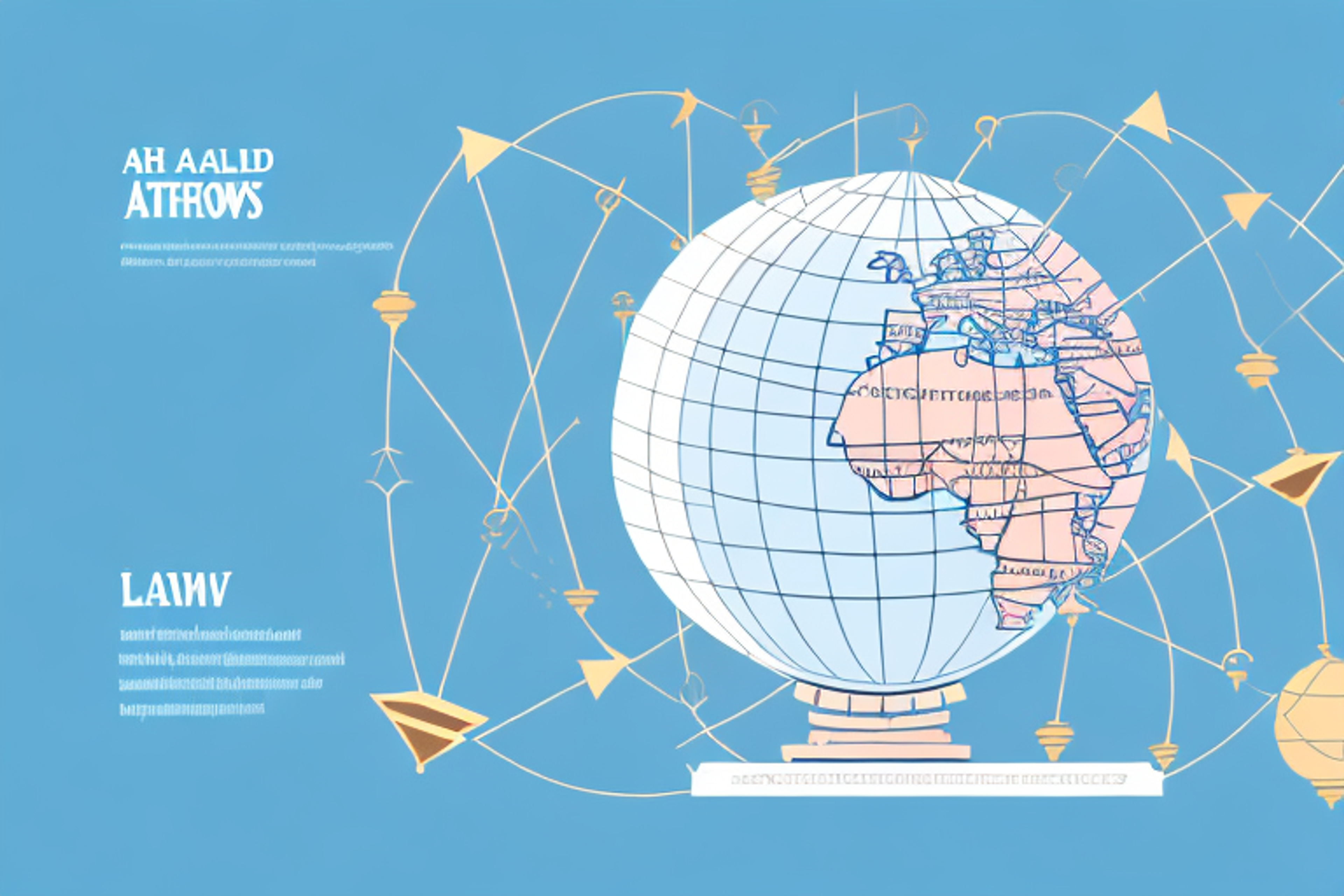Working in International Law: Opportunities and Challenges
Discover the exciting world of international law and explore the opportunities and challenges that come with it.
Posted March 6, 2025

Table of Contents
International law is a dynamic and exciting field with many opportunities and challenges for those who work in it. As globalization has increased, so has the need for lawyers who specialize in international law. In this article, we will explore the basics of international law, the importance of the field in today's globalized world, job opportunities in international law, advantages and disadvantages of working in this field, challenges faced by international lawyers in their career, the role of technology in the future of international law, how to build a successful career in international law, skills required for a career in international law, cultural sensitivity in international law, top industries for international lawyers to work in, the future outlook for jobs in international law, navigating ethical issues as an international lawyer, and networking strategies for success in the field of international law. We will also discuss the importance of balancing work and life as an international lawyer.
Understanding the Basics of International Law
International law is a set of rules and principles that govern relations between states and other international actors such as international organizations and non-state actors. It covers a wide range of areas, including human rights, trade, environment, and war. The sources of international law include treaties, customary international law, and general principles of law recognized by civilized nations. International law is enforced by international tribunals, national courts, and states themselves.
International law is important because it helps to maintain peace and stability in the world. It also ensures that states are held accountable for their actions and that international human rights are protected. International law facilitates cooperation between states and promotes economic growth and development.
One of the challenges of international law is that it is difficult to enforce. Unlike domestic law, there is no global police force or court system to ensure compliance. Instead, states must rely on diplomatic pressure, economic sanctions, and other non-coercive measures to encourage compliance. This can be a slow and uncertain process, and some states may choose to ignore international law altogether if they believe it is not in their interests to comply.
The Importance of International Law in Today's Globalized World
In today's globalized world, international law is more important than ever before. Globalization has increased trade, investment, and travel, and has created new challenges for international law. With the rise of multinational corporations and global issues such as climate change, international law plays a crucial role in regulating these activities and ensuring that they are conducted in a fair and sustainable way. International law also provides a framework for resolving disputes between states and promoting cooperation between them.
One of the key benefits of international law is that it helps to promote human rights and protect vulnerable populations. For example, international human rights law provides a framework for protecting the rights of refugees and asylum seekers, ensuring that they are treated fairly and with dignity. Similarly, international criminal law helps to hold individuals accountable for war crimes, genocide, and other atrocities, promoting justice and accountability.
Another important aspect of international law is its role in promoting sustainable development. International environmental law, for example, provides a framework for addressing global environmental challenges such as climate change, deforestation, and pollution. By establishing standards and guidelines for environmental protection, international law helps to ensure that economic development is conducted in a way that is environmentally sustainable and socially responsible.
Job Opportunities in International Law: A Comprehensive Guide
There are many job opportunities in international law, both in the public and private sectors. Some of the most common jobs include working for international organizations such as the United Nations, non-governmental organizations (NGOs), law firms that specialize in international law, and government agencies that deal with international affairs. Jobs in international law can be based in the home country or abroad, and may involve travel.
It is important to note that job opportunities in international law are not limited to legal professionals. Many organizations also hire individuals with backgrounds in fields such as political science, economics, and international relations. Additionally, fluency in multiple languages is often a highly valued skill in the field of international law, as it allows for effective communication with individuals from diverse backgrounds.
Advantages and Disadvantages of Working in International Law
Working in international law has many advantages, including the opportunity to travel, work on interesting and challenging cases, and make a difference in the world. However, there are also some disadvantages, including the long hours, high stress, and the potential for burnout. International lawyers also face challenges such as navigating different legal systems and cultural norms, and balancing the interests of different stakeholders.
Another disadvantage of working in international law is the high level of competition. As international law is a highly specialized field, there are limited job opportunities available, and the competition for these positions can be intense. Additionally, international lawyers often need to have a strong academic background and language skills, which can make it difficult for some individuals to break into the field.
Challenges Faced by International Lawyers in Their Career
International lawyers face many challenges in their career, including navigating different legal systems and cultural norms, dealing with language barriers, and managing the interests of multiple stakeholders. They must also be flexible and adaptable to changing circumstances, be able to work under pressure, and be able to handle complex cases.
Another challenge faced by international lawyers is the need to stay up-to-date with constantly changing laws and regulations in different countries. This requires a significant amount of research and ongoing education to ensure that they are providing accurate and effective legal advice to their clients. Additionally, international lawyers often work long hours and may need to travel frequently, which can lead to a work-life balance challenge.
The Role of Technology in the Future of International Law
Technology is playing an increasingly important role in the future of international law. It has the potential to make legal research and document preparation more efficient and effective, and can also help lawyers to communicate with clients and colleagues around the world. However, it also raises concerns about data privacy, cybersecurity, and the potential for automation to replace human lawyers.
One area where technology is already having a significant impact on international law is in the field of dispute resolution. Online dispute resolution (ODR) platforms are becoming increasingly popular, allowing parties to resolve disputes without the need for costly and time-consuming court proceedings. ODR platforms can also provide greater access to justice for individuals and businesses in developing countries, where traditional legal systems may be less accessible or effective.
How to Build a Successful Career in International Law
Building a successful career in international law requires a combination of education, experience, and networking. A strong educational background in law and international relations is important, as is gaining practical experience through internships and volunteer work. It is also important to build a professional network and to develop expertise in a particular area of international law.
Additionally, staying up-to-date with current events and changes in international law is crucial for success in this field. This can be achieved through attending conferences, reading industry publications, and participating in continuing education courses. It is also important to have strong communication and negotiation skills, as international law often involves working with individuals from diverse cultural backgrounds and navigating complex legal systems.
Skills Required for a Career in International Law: A Complete Guide
The skills required for a career in international law include strong analytical skills, the ability to communicate effectively across cultures and languages, legal research skills, and the ability to work under pressure. Other important skills include teamwork, cultural sensitivity, leadership, and adaptability.
Additionally, a career in international law requires a deep understanding of international relations, politics, and economics. Professionals in this field must be able to navigate complex legal systems and understand the implications of their decisions on a global scale. They must also possess strong negotiation skills and the ability to resolve conflicts peacefully.
Furthermore, staying up-to-date with current events and changes in international law is crucial for success in this field. Professionals must be able to adapt to new laws and regulations, as well as changing political climates. Continuing education and professional development are essential for staying informed and maintaining a competitive edge in the field of international law.
Cultural Sensitivity in International Law: Why It Matters and How to Develop It
Cultural sensitivity is important in international law because it helps lawyers to navigate different legal systems and cultural norms, and to build trust and rapport with clients and colleagues from diverse backgrounds. To develop cultural sensitivity, it is important to listen actively, be open to new ideas and perspectives, and to seek out cultural immersion experiences.
Top Industries for International Lawyers to Work In
Some of the top industries for international lawyers to work in include the United Nations, international human rights organizations, international law firms, and multinational corporations. Other industries that may offer opportunities for international lawyers include government agencies, academic institutions, and non-governmental organizations.
The Future Outlook for Jobs in International Law
The future outlook for jobs in international law is positive, as globalization is expected to continue and new challenges will arise that require legal expertise. However, competition for jobs may be strong, and international lawyers will need to stay up-to-date with new legal developments and technologies.
Navigating Ethical Issues as an International Lawyer
International lawyers face many ethical issues in their work, including conflicts of interest, confidentiality concerns, and human rights violations. To navigate these issues, it is important to follow professional codes of conduct, seek guidance from colleagues and mentors, and to be open and transparent with clients and stakeholders.
Networking Strategies for Success in the Field of International Law
Networking is important for success in any field, and it is particularly important for international lawyers. Networking can help you to build a professional network, learn about new job opportunities, and expand your knowledge and expertise. Some effective networking strategies include attending conferences and events, joining professional organizations, and reaching out to colleagues and mentors.
Balancing Work and Life as an International Lawyer
Finally, it is important for international lawyers to balance work and life to avoid burnout and maintain their wellbeing. This can be challenging given the long hours and high stress of the job, but it is important to make time for hobbies, exercise, and socializing. Effective time management is also important, as is setting realistic goals and expectations for yourself.
In conclusion, working in international law offers many opportunities and challenges. To succeed in this field, it is important to develop the necessary skills, build a professional network, and stay up-to-date with new legal developments and technologies. Cultural sensitivity, ethical awareness, and work-life balance are also important for success in this dynamic and exciting field.











